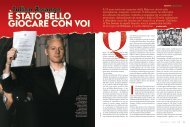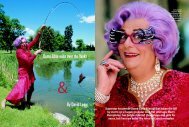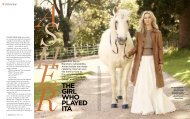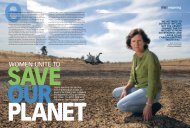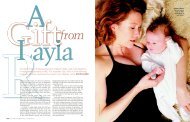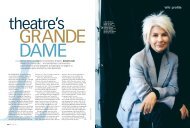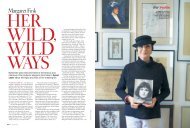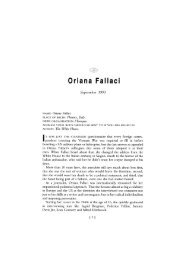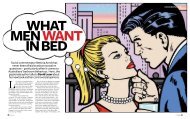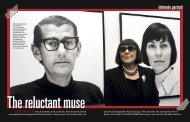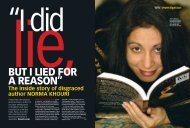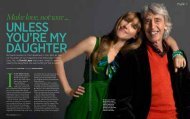Read Article - David Leser
Read Article - David Leser
Read Article - David Leser
Create successful ePaper yourself
Turn your PDF publications into a flip-book with our unique Google optimized e-Paper software.
102 THE AUSTRALIAN WOMEN’S WEEKLY – DECEMBER 2001<br />
PHOTOGRAPHY BY ARNAUD FEVRIER/MPA/BIG AUSTRALIA.<br />
I would restore things with a few phrases.<br />
The Story was part of our everyday life,<br />
to the point that it caused arguments and<br />
passions to flare.<br />
“I truly, humbly believe that The Story saved<br />
us all. It helped give a pattern to our lives. The<br />
radio permitted us to keep track of the date,<br />
but we had no markers, no milestones in our<br />
lives ... so our characters had them for us:<br />
they got engaged, married, had babies, fell<br />
ill, died.<br />
“Thanks to The Story, the characters, we<br />
didn’t succumb to madness.”<br />
At least, that is, until a day in late 1986<br />
when “the Apocalypse” engulfed them.<br />
In March of that year, after eight years<br />
of being kept apart, the family was finally<br />
allowed out of their separate cells. Barely able<br />
to walk, having not seen daylight for nearly a<br />
decade, they came together in a moment of<br />
wild transcendental joy.<br />
“We had all changed so much,” said Malika,<br />
“and each one of us had grown taller or older.<br />
Mother didn’t recognise her little girls. She<br />
had last seen Soukaina and Maria when they<br />
were 14 and 15 years old, and now they were<br />
young women of 22 and 24. Raouf was a man,<br />
resembling my father in build. Abdellatif was<br />
now a youth of 17.<br />
“Mother was as beautiful as ever, but the<br />
hardship and grief had taken a terrible toll ...<br />
We were gaunt and pale, with dark rings round<br />
our eyes and bloodless lips, sparse hair and legs<br />
that were barely able to carry us. Mother gazed<br />
at us for hours. She never tired of looking at us,<br />
but she cried in secret to see us so emaciated,<br />
so starved.”<br />
Their joy at being together would last from<br />
March until November 1986 when, suddenly,<br />
without any explanation, they were split up<br />
again.<br />
At this point, their mother attempted<br />
– unsuccessfully – to kill herself. Fatima Oufkir<br />
began a 45-day hunger strike and, at last, on<br />
the night of November 26, slit her veins with a<br />
pair of small nail scissors.<br />
Pandemonium broke out in the other cells.<br />
In Malika’s cell, the sisters drew straws to see<br />
who would also die. Soukaina “won” and Malika<br />
began helping to slash her veins with a sardine<br />
can and knitting needle. Back in solitary, Raouf<br />
decided to end his life as well.<br />
“That night, we went crazy,” said Malika.<br />
“The whole situation became a psychodrama<br />
brought to life ... we had completely lost our<br />
bearings and all notions of reality.<br />
“That night of the long knives, as we called<br />
it, was the worst night of our entire lives.<br />
Malika at home in Paris with her husband, French architect Eric Bordreuil, and<br />
Nawal, six, the daughter of Malika’s sister, Myriam, whom they have adopted.<br />
“Mother never tired of looking at us, but<br />
she cried in secret to see us so ... starved.”<br />
Anything was possible: murdering a sibling,<br />
suicide, or blowing up the prison with our<br />
butane cylinders.”<br />
In their first prison, nearly 15 years earlier,<br />
a friendly guard had allowed a renowned<br />
clairvoyant from a nearby village to come and<br />
see them.<br />
He told them their ordeal would last a very<br />
long time, but that a miracle would eventually<br />
intervene.<br />
Perhaps this was the miracle, because<br />
not only did none of the family die<br />
that night, but it galvanised them into action.<br />
In fact, five months later, they executed one of<br />
the most audacious escapes imaginable.<br />
Using a spoon, the lid of a sardine can and<br />
an iron bar from one of their beds, they began<br />
excavating a tunnel in the small cell adjoining<br />
Malika’s, where they kept their suitcases and<br />
food rations.<br />
Working by night when the guards were<br />
absent, Malika, Maria and Soukaina (Myriam<br />
was too sick to help) smashed concrete, freed<br />
stone slabs, dug holes between cells and<br />
burrowed a five-metre tunnel and threemetre<br />
shaft out of the prison. It took them<br />
three months.<br />
Each night they covered their tracks by<br />
washing the cell, removing the earth and dust<br />
and replacing the stone slabs with a cement<br />
mixture of earth, washing powder and flour<br />
that looked exactly like the wall. The guards<br />
never noticed.<br />
On the night of April 19, 1987, Malika,<br />
Raouf, Maria and Abdellatif escaped.<br />
Wild-eyed, their bodies bloated from the<br />
effects of starvation, wearing shoes cut from<br />
their old designer suitcases, they remained at<br />
large for five electrifying, sleepless, famished<br />
days, managing to elude the Moroccan army<br />
and secret police in the process.<br />
During that time, they returned to their<br />
old neighbourhood and found, to their horror,<br />
the family home razed to the ground. Even<br />
more shocking, many of their old friends<br />
turned them away, too scared to be seen in<br />
their company.<br />
In desperation they contacted French<br />
television, which broadcast their plight<br />
and amazing escape around the world.<br />
So embarrassed was the King by these<br />
revelations that he ordered the remaining<br />
family members released from prison. At last it<br />
appeared they would be given their freedom.<br />
They could realise their dream of going to<br />
Canada.<br />
However, on the day the family was<br />
to board the plane for Montreal, the King<br />
announced a change of heart. He had<br />
not “completely adjusted” to the family<br />
leaving Morocco and wanted them to<br />
stay a while longer.<br />
He placed them under house arrest in a<br />
luxurious villa in Marrakesh for the next threeand-a-half<br />
years.<br />
In February 1991, the Oufkirs were finally<br />
released, but placed under tight police<br />
surveillance and prevented from leaving the<br />
country. This situation lasted five more years,<br />
until in June 1996, Malika’s younger sister,<br />
Maria, escaped by boat to Spain and then<br />
France.<br />
Under international pressure, the<br />
Moroccan government was forced to issue<br />
the family with passports and visas. Malika<br />
Oufkir arrived in Paris on July 16, 1996, with<br />
her brother Raouf and sister Soukaina. She<br />
▲<br />
THE AUSTRALIAN WOMEN’S WEEKLY – DECEMBER 2001 103



